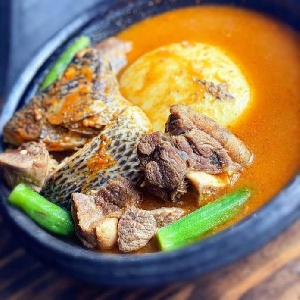In the rich tapestry of Ghanaian cuisine, fufu holds a special place. This staple food, made primarily from cassava and plantains, is a beloved part of many meals. However, for individuals living with diabetes, the consumption of fufu poses significant health considerations. Herbal Doctor Asonaba Owusu Aduomi, a renowned natural health advocate and fitness guru, sheds light on the implications of consuming fufu for those managing diabetes.
The Nutritional Profile of Fufu
Fufu is a high-carbohydrate food, typically served alongside soups. The primary ingredients, cassava and plantains, are rich in starch - a complex carbohydrate. Upon digestion, starch is broken down into glucose, which significantly impacts blood sugar levels.
Diabetes: A Brief Overview
Diabetes is a chronic condition characterized by elevated blood sugar levels due to the body’s inability to produce or effectively use insulin. Managing carbohydrate intake is crucial for diabetics to maintain stable blood sugar levels.
Fufu and Blood Sugar Management
For diabetics, consuming high-carbohydrate foods like fufu can lead to spikes in blood sugar. These spikes are concerning as they can exacerbate the symptoms of diabetes and increase the risk of complications such as cardiovascular disease, kidney damage, and nerve damage.
Portion Control and Glycemic Index
Understanding portion control and the glycemic index (GI) of foods is vital. Fufu has a moderate to high GI, meaning it can raise blood sugar levels quickly. Herbal Doctor Asonaba emphasizes the importance of moderation in the consumption of fufu. Smaller portions can mitigate the impact on blood sugar levels.
The Role of Accompaniments
The soups and stews served with fufu also play a crucial role. Opting for soups rich in vegetables and lean proteins can help balance the meal. It's advisable to limit high-fat and high-sodium ingredients, which can lead to additional health issues.
Exercise and Blood Sugar Control
Herbal Doctor Asonaba, a distinguished fitness guru, also stresses the importance of regular exercise in managing diabetes. Physical activity helps in regulating blood sugar levels and improving insulin sensitivity.
The Importance of a Balanced Diet
A balanced diet is key in diabetes management. It should include a variety of foods providing essential nutrients while maintaining blood sugar levels. Herbal Doctor Asonaba advocates for a diet rich in fruits, vegetables, whole grains, lean protein, and healthy fats.
Listening to Your Body
Each individual’s response to food can vary. Herbal Doctor Asonaba encourages diabetics to monitor their blood sugar levels to understand how different foods, including fufu, affect them.
Conclusion
Fufu, a staple in Ghanaian cuisine, can be part of a diabetic diet when consumed with caution. Understanding its effects on blood sugar, practising portion control, opting for healthier preparations, and maintaining an overall balanced diet and exercise regime are essential steps. For diabetics, enjoying traditional foods like fufu requires mindful adjustments to support their health journey.
For a more in-depth understanding and practical advice, readers are encouraged to watch Herbal Doctor Asonaba Owusu Aduomi’s full video on the implications of eating fufu with diabetes. Click [here](#) to watch the full video and gain valuable insights from a seasoned herbal doctor and natural health advocate.
Opinions of Monday, 26 February 2024
Columnist: Asonaba Owusu Aduomi















